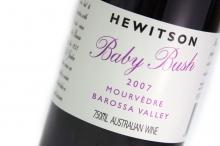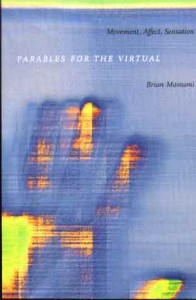Massumi and Malbec 2: Guest Post by Corey Wakeling
 Since Brian Massumi’s Parables for the Virtual is in effect a piece of Deleuzian theory and by nature indulges in micro-theses embedded in paragraphs, I feel it’s worth making a veritable castle gate out of the primary thesis put forward by ‘The Bleed’ to help us all start on the right foot with this week’s chapter. So here it is:
Since Brian Massumi’s Parables for the Virtual is in effect a piece of Deleuzian theory and by nature indulges in micro-theses embedded in paragraphs, I feel it’s worth making a veritable castle gate out of the primary thesis put forward by ‘The Bleed’ to help us all start on the right foot with this week’s chapter. So here it is:
Rethink body, subjectivity, and social change in terms of movement, affect, force, and violence – before code, text, and signification.
As we know from Chapter One, this book’s primary task is to re-introduce theories of affect into the cultural theory landscape. By nature, as definitionally a term used to describe non-cerebral, non-rational, and emotional influence and intensity – intensity being Massumi’s privileged noun – affect was the victim of disregard under postmodern theory due to its seemingly impossible assimilability within methodologies of cultural analysis and deconstruction. As lit theory students, we know well one of our first-year edicts: the affective fallacy. Affect qualified is emotion, but Massumi nips this in the bud early on in Chapter One when he says that, “Intensity is qualifiable as an emotional state and that state is static…” This leads us to ‘The Bleed’, and an important distinction: affect, also known as intensity, bleeds over our receptivity to it. What would otherwise be approached as the language of subjectivity, or the language of human feeling, here is recovered as a site that must be investigated as a “resonating chamber”. Receiving affective energy, the body then responds to the stimulus by making sense of it, first bodily (and this has vicissitudes that I will later explain) and then in language. What we have in this chapter is the concerted attempt to construct an incorporeal materialism – a Massumian appellation for Deleuze’s transcendental materialism – that accounts for the real, material influence of virtuality on the actual, and the actual’s communication through virtuality. So, the task is to include sensation that is either too small or too amorphous or opaque as a part of our critical programmes, and in the process perhaps succeed in following Nietszche’s admonishment of being human-all-too-human and move towards ontological analysis that accounts for becomings via means that are not necessarily entirely explicable as purely sociological or psychological phenomena. Massumi explains that cultural theory as it stands is not all wrong, it’s just that we need to be articulating a language and a philosophy that better deals affect and intensity. READ MORE >
Massumi and Malbec: A Virtual Reading Group
 A few weeks ago, in the comments section of my post on affect, Roxane brought up the idea of having a reading group for Parables for the Virtual: Movement, Affect, Sensation by Brian Massumi. She also said her teacher advised reading Massumi alongside wine; her suggestion was a complex red. Thus Massumi and Malbec.
A few weeks ago, in the comments section of my post on affect, Roxane brought up the idea of having a reading group for Parables for the Virtual: Movement, Affect, Sensation by Brian Massumi. She also said her teacher advised reading Massumi alongside wine; her suggestion was a complex red. Thus Massumi and Malbec.
My copy is now in hand, so I’m ready. But to give others a bit more time, let’s say we’ll discuss the intro and chapter one (“The Autonomy of Affect”) in roughly two weeks. So if you’d like to participate, order the book and read those sections by Saturday, January 16.
My other thought is that a different person might profitably lead the discussion for each chapter, on a chapter per week schedule. So if you would be interested in committing to lead a chapter discussion, either by posting about it if you are an HTMLGiant contributor or guest-posting under my auspices if you aren’t, please email me at my first and last name at gmail. There are nine chapters, so in case not enough people want to do this, please let me know if you’d be willing to host two chapter discussions. However you’d like to go about leading the discussion is totally up to you.
If you aren’t willing to lead a discussion (that’s cool!), but you plan to follow along/guzzle vino/discuss, do say so in the Comments so that I have a sense of whether this is something people really want to do after all.
